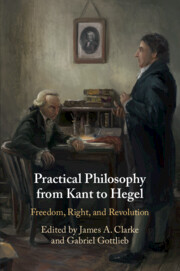Book contents
- Practical Philosophy from Kant to Hegel
- Practical Philosophy from Kant to Hegel
- Copyright page
- Contents
- Contributors
- Acknowledgments
- Abbreviations
- Introduction
- 1 The Original Empty Formalism Objection
- 2 Freedom and Ethical Necessity
- 3 Maimonides and Kant in the Ethical Thought of Salomon Maimon
- 4 Erhard on Right and Morality
- 5 Erhard on Revolutionary Action
- 6 Elise Reimarus on Freedom and Rebellion
- 7 Freedom and Duty
- 8 Fichte’s Ethical Holism
- 9 Jacobi on Revolution and Practical Nihilism
- 10 The Political Implications of Friedrich Schlegel’s Poetic, Republican Discourse
- 11 The Limits of State Action
- 12 Echoes of Revolution
- 13 Public Opinion and Ideology in Hegel’s Philosophy of Right
- Bibliography
- Index
5 - Erhard on Revolutionary Action
Published online by Cambridge University Press: 16 March 2021
- Practical Philosophy from Kant to Hegel
- Practical Philosophy from Kant to Hegel
- Copyright page
- Contents
- Contributors
- Acknowledgments
- Abbreviations
- Introduction
- 1 The Original Empty Formalism Objection
- 2 Freedom and Ethical Necessity
- 3 Maimonides and Kant in the Ethical Thought of Salomon Maimon
- 4 Erhard on Right and Morality
- 5 Erhard on Revolutionary Action
- 6 Elise Reimarus on Freedom and Rebellion
- 7 Freedom and Duty
- 8 Fichte’s Ethical Holism
- 9 Jacobi on Revolution and Practical Nihilism
- 10 The Political Implications of Friedrich Schlegel’s Poetic, Republican Discourse
- 11 The Limits of State Action
- 12 Echoes of Revolution
- 13 Public Opinion and Ideology in Hegel’s Philosophy of Right
- Bibliography
- Index
Summary
In a pair of texts published in 1795, the philosopher, physician, and public intellectual Johann Benjamin Erhard offered a broadly Kantian defense of the right to revolution under conditions of structural injustice. Erhard’s theory of revolution is of continuing interest, for Erhard’s theory touches on difficult practical questions related to what we might call the ethics of revolutionary action. The primary aim of my paper is reconstructive; I aim to give a philosophical account of the overall shape of Erhard’s theory of justified revolutionary action. In the course of my reconstruction of Erhard’s account, I focus especially on the central role of epistemic limitations regarding the consequences of revolutionary action in Erhard’s account. Erhard is focused on the fact that revolution is an inherently risky endeavor, with potentially enormous downsides for society, and for those on whose behalf revolutionaries purport to act. Erhard takes the problem of revolution’s dangerous unpredictability very seriously as an obstacle to the justification of revolutionary action. This is both a merit of his account, and the source of some interpretative and philosophical puzzles, which occupy me in the second half of the paper.
- Type
- Chapter
- Information
- Practical Philosophy from Kant to HegelFreedom, Right, and Revolution, pp. 80 - 98Publisher: Cambridge University PressPrint publication year: 2021
- 1
- Cited by

